Marine Life & Conservation
Lionfish: a very spiny problem!
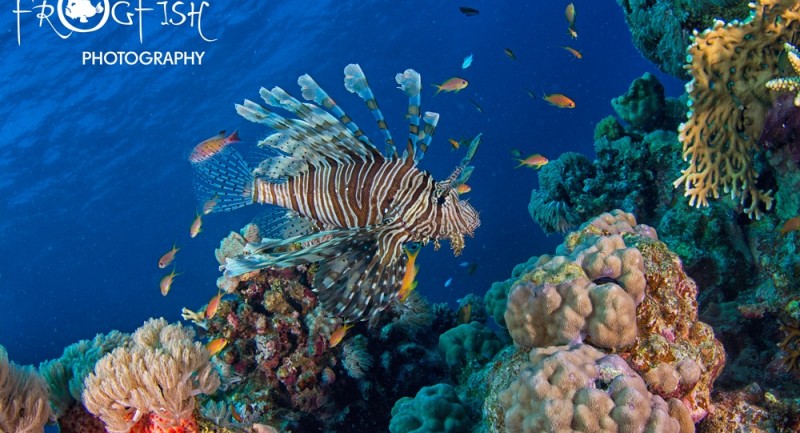
For anyone who has been diving in the Caribbean in the last few years, you have probably heard of the lionfish problem. Having taught marine biology & conservation in the Caribbean for several years, it’s a question I get asked about a lot. This blog explains some of the facts about lionfish and what we can do to help our reefs:
- Where should they be?
- How did they get into the Caribbean?
- What is all the fuss about?
- What you can do to help the reefs?
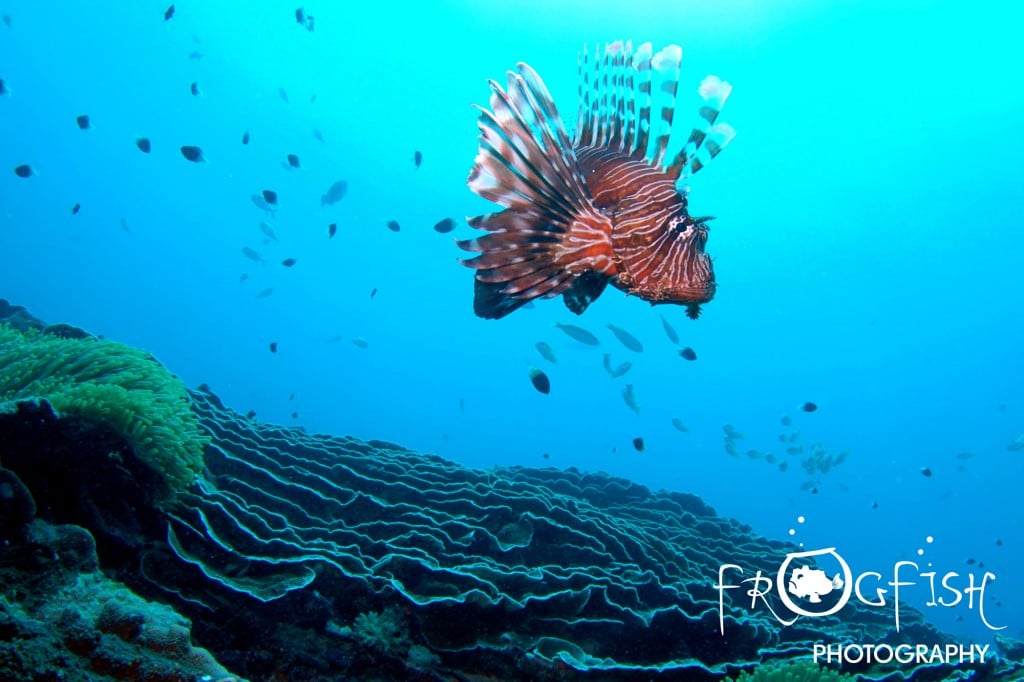
Where should they be?
Lionfish are a beautiful predatory fish, native to the Indian and Pacific Oceans and the Red Sea.
In their native habitat the lionfish is great to observe and photograph. They are not very common as they have natural predators that keep population down and in balance with the other reef fish (Density/hectare in the Pacific is ~20).
How did they get into the Caribbean?
Unfortunately since 1992, two species of lionfish (Pterois volitans & Pterois miles) are now found in the Atlantic Ocean and the Caribbean Sea, where they are an invasive species. The theory is that captive lionfish were released or escaped off the coast of Florida and the population has spread. Lionfish established themselves in the Caribbean in less than 3 years and range from North Carolina to South America including the Gulf of Mexico. From a few individuals in 1992 the population has now spread out of control to become a major problem in the ecosystem (Density/hectare in Caribbean ~398 in 2012).
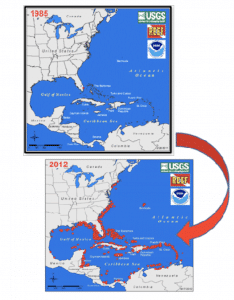
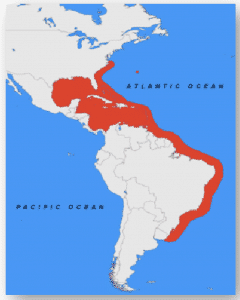
What is all the fuss about?
Why are lionfish an issue?
To understand the issue, we first need to know a bit about the fish.
Lionfish biology:
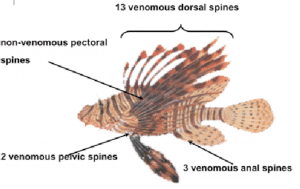
They have venomous tissue within their spines for protection and are generalist carnivores. Adults can grow up to 42cm and have a lifespan of 5-10 years. They become sexually mature in less than a year and spawn in pairs. Females can release 30,000 eggs at one time. Enclosed in a mucus layer, the eggs float to the surface. In a few days the mucus dissipates and the eggs are released to be dispersed by ocean currents.
Habitat & ecology
Lionfish inhabit all marine habitat types (reefs, lagoons, mangroves, sea grass beds, sand patches and artificial substrates) and can handle tropical temperatures all the way down to 10°C. They can also live at a huge range of depths (from shoreline to over 300m or 1000 feet), though they tend to be territorial, so may remain in the same area for up to 7 months. They appear to be attracted to cleaning stations.
So why are they a problem?
Lionfish have no natural predators in the Caribbean. The density per hectare of invasive lionfish is around 20x higher than in their native waters. They consume over 70 species of fish and many invertebrate species and can eat prey up to half their body length (basically they can eat pretty much anything!). This makes them top predators along with sharks, rays and groupers. By colonising mangroves and sea grass beds they pose a major threat to juvenile fish (this is where lots of baby fish live until they are big enough to survive out on the reef).
On heavily invaded sites, lionfish have reduced their fish prey population by up to 90% and continue to consume native fishes at unsustainable rates. Many reefs have been decimated of the native reef fish as the lionfish consume until supply of fish has run out. Once the food has run out, lionfish can survive for 12 weeks with no food, so can move on to other feeding grounds. Reefs without fish don’t function, so the coral also starts to suffer.
Invasive lionfish reproduction occurs throughout the year and as frequently as every 4 days (whereas native Indo-Pacific lionfish breed only once a year!). This means an invasive female lionfish can lay over 2 million eggs/year in the Caribbean. And unlike in the Indo-Pacific, many of these eggs will survive to adulthood. This means the populations are increasing at a phenomenal rate (700% in 4 years!).
Where lionfish containment programs operate, the deep dwelling fish can be very hard to get to in order to kill or capture. So lionfish pose a threat to the integrity of the reef food web and can have wide reaching impacts on commercial fisheries, tourism, and overall coral reef health.
What you can do to help the reefs?
Educate others and spread awareness of lionfish.
EAT THEM!! They are a delicious delicacy (see RECIPES below!). Also eating this fish reduces pressure on fish stocks of native species.
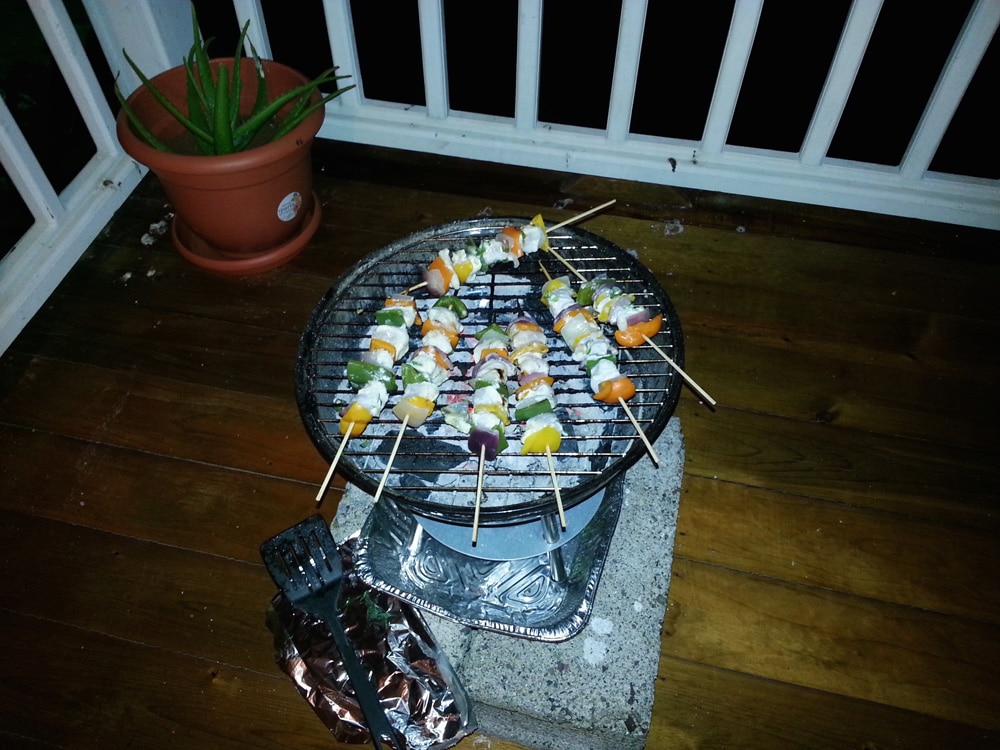
Encourage local restaurants to serve Lionfish and promote consumption by community members.
We need to be the main predator and keep dive sites as free of Lionfish as possible. Though we cannot get all of them, reducing the numbers on the coral reef and shallow water can really help native fish species and coral health.
Lionfish removal:
Spearing lionfish is quick and safe if done properly (Hawaiian Slings can be used very effectively). A tube container is recommended to store captured fish.
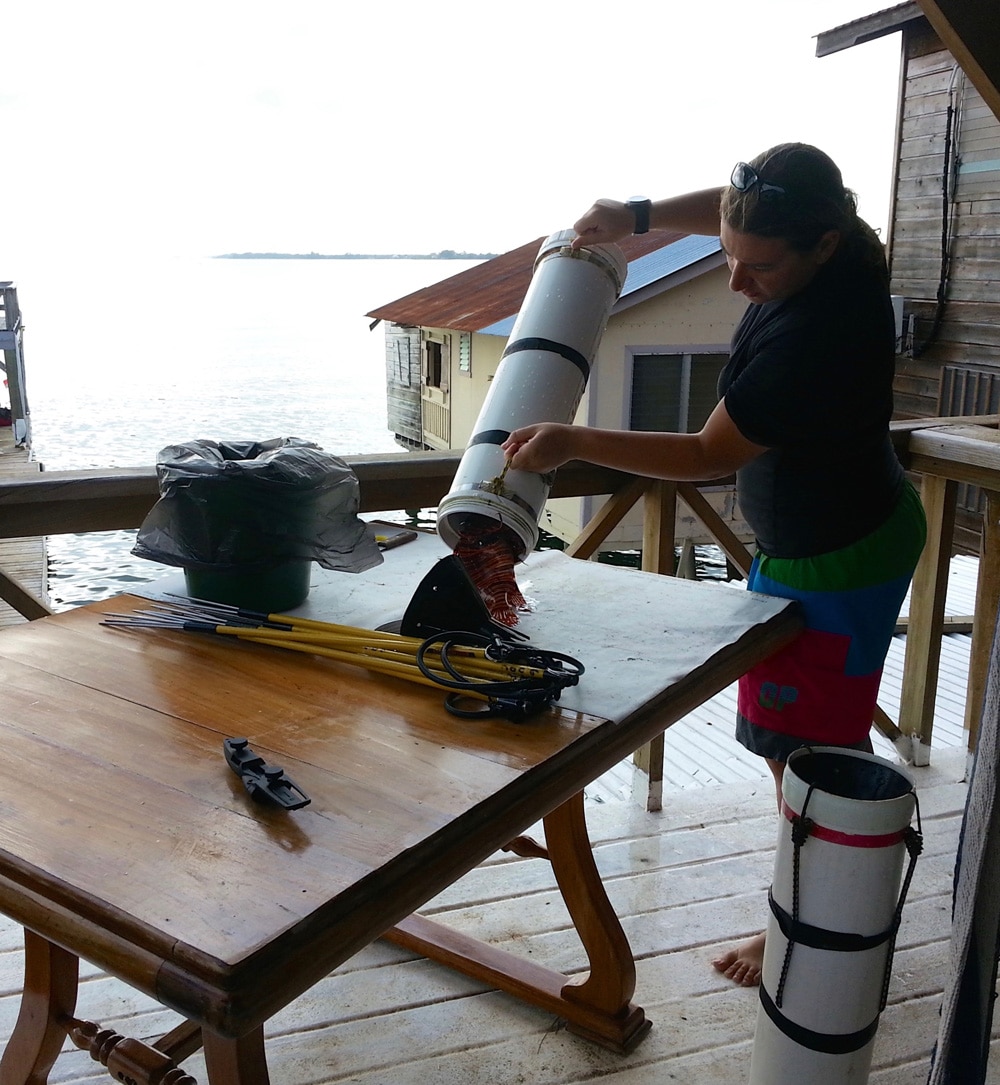
Many marine park authorities and islands have licensed spearing lionfish as local removal efforts can significantly reduce lionfish densities and subsequent impacts. Efforts are invaluable for supporting other conservation initiatives like management of marine protected areas, pollution control and fish stock rebuilding in order to help our reefs.
Try our favourite Lionfish Recipes! To see them click here.
- Island Lionfish Fry
- Lionfish Ceviche
- Lionfish Coconut Curry
- Coconut Lionfish with Spicy Mango Dip
- Marinara Lionfish Spaghetti
- Lionfish Tacos with Street Corn and Salsa
- Cajun Spiced Lionfish Fillets with Mango Salsa
- White Wine Lionfish
- Lionfish Sanganaki
- BBQ Lionfish: Kebabs and Parcels
Marine Life & Conservation
Paul Watson Released as Denmark Blocks Japan’s Extradition Bid

Renowned anti-whaling activist Paul Watson has been released from custody in Greenland after spending five months in detention. Denmark’s Justice Ministry rejected Japan’s request for his extradition, citing insufficient guarantees that his time already served in custody would be credited against any potential sentence.
The 74-year-old Canadian-American was arrested on July 21 in Nuuk, Greenland’s capital, when his ship docked to refuel. His arrest was based on a 2012 Japanese warrant related to a 2010 encounter in Antarctic waters. Japan alleged Watson obstructed operations and caused damage to a whaling research ship during efforts to disrupt illegal whaling. Watson has consistently denied these claims, maintaining his commitment to marine conservation.
Denmark, which oversees extradition matters for Greenland, concluded that while the legal conditions for extradition were met, the lack of assurances from Japan regarding time-served credit made extradition untenable.
In a video shared by his foundation, Watson expressed gratitude and relief, saying, “After five months, it’s good to be out… and good to know they’re not sending me to Japan.” He added that the most difficult part of his time in custody was being separated from his two young sons.
Watson is a pioneering figure in marine conservation, known for founding the Captain Paul Watson Foundation in 2022 after decades of activism with the Sea Shepherd Conservation Society. His bold efforts to defend marine life have earned him widespread support, including from celebrities and conservationists. His work has also been featured in the acclaimed reality TV series Whale Wars.
Watson’s lawyer, Jonas Christoffersen, praised the decision, stating, “We are happy and relieved that Paul Watson is now free.” He added that Watson is eager to reunite with his family and continue his vital work.
The arrest occurred while Watson’s vessel, the M/Y John Paul DeJoria, was en route to the North Pacific with a team of 26 volunteers to intercept a Japanese whaling ship. His foundation described the arrest as politically motivated and emphasized that Watson’s actions were focused on ending illegal whaling practices.
Japan resumed commercial whaling in 2019 after leaving the International Whaling Commission, asserting that whale meat is a cultural tradition. Conservationists, however, continue to challenge these practices, highlighting their impact on marine ecosystems.
Despite the challenges, Watson remains steadfast in his mission to protect marine life and bring attention to whaling practices. His dedication to ocean conservation has made him a globally respected advocate for the environment.
Marine Life & Conservation
12 Days of Zero-Waste Fish-mas

This holiday period, the Marine Conservation Society, the UK’s leading ocean membership charity, invites you to make some simple changes to eating fish this Christmas to help our seas.
Dr Kenneth Bodles, Head of Fisheries and Aquaculture at the Marine Conservation Society, said, “During the festive season, our consumption increases, but so does waste. Sustainability isn’t just about where food comes from – it’s also about how you use it. By reducing waste and making the most out of your seafood, you’re not only taking steps to be more ocean-friendly, but can also help to cut costs during what is often one of the most expensive times of the year”.
The Marine Conservation Society has compiled twelve tips on how to consume seafood sustainably with zero-waste this Christmas:
Buy whole fish instead of fillets
Instead of fillets, consider buying whole fish such as salmon, hake, or lemon sole. By adopting a “nose to tail” approach with cooking, whole-baked fish not only feeds a crowd, but also helps to minimise waste and maximise sustainability by using up every part of the animal, including bones, skin, and fat.
Make fish stock
Leftover fish bones or shells can be put to good use by boiling them to make a nourishing fish stock or bisque. This can be frozen and preserved for later use and makes for a flavourful base in a soup.
Make your own fish pâté
Avoid waste by turning leftover fish, such as smoked mackerel or salmon, into a delicious pâté by blending with cream cheese and lemon. Perfect when paired with crackers.
The sustainability of salmon and mackerel varies depending on where and how it is caught or farmed. For more information on green-rated options, check the charity’s Good Fish Guide.
Buy frozen
By purchasing seafood that is frozen or vacuum-packed, this helps to reduce waste by extending the shelf life of your food.
Fish pie
If you’re wondering what to do with leftover cooked fish, why not opt for a classic fish pie with mashed potatoes, leeks, and a cheesy sauce? A sure crowd pleaser on Boxing Day.
Use the head
Don’t forget the fish head! The meat is incredibly tender and flavourful. The charity recommends a cod’s head curry or recreating Fallow’s renowned cod’s head in siracha butter.
By stretching your ingredients further, not only is this a more sustainable way to enjoy seafood, but also cost-effective by repurposing leftovers and cooking creatively.
Boxing Day brunch
Mix leftover kippers or smoked salmon with scrambled eggs for a tasty, zero-waste, Boxing Day brunch.
For best choice, make sure you buy kippers, or herring, from the North Sea and the North Irish Sea.
Zero-waste storage
A top tip from the Marine Conservation Society to avoid waste is freezing fish offcuts to save for future use.
Crisp up the skin
Even leftover fish skin can be turned into a quick savoury snack by crisping it up in an air fryer with a little olive oil and salt.
Anchovies two ways
Leftover anchovies can either be blended with butter to make a delicious anchovy butter or tossed into pasta for a hit of umami flavour.
The charity recommends opting for anchovies caught in the Bay of Biscay for best choice.
Fishcakes
For an easy, zero-waste meal, leftover seafood trimmings can be mixed with mash and fried in breadcrumbs to make fishcakes.
Pickled mussels
Try pickling mussels in 1:1 vinegar and water, with a dash of sugar for a sustainable, zero-waste snack that can be enjoyed well beyond the festive season.
Mussels farmed in the UK are a seafood superhero. Grown using low-impact methods and harvested by hand, they get all the food they need from the sea around them. This makes them one of the most sustainable, ocean-friendly, and cost-effective seafood options.
Players of People’s Postcode Lottery have raised £6.6M towards the Marine Conservation Society’s vital work in making seafood more sustainable.
Laura Chow, Head of Charities at People’s Postcode Lottery, said: “Fish is a festive favourite for many, but making sustainable choices when it comes to how we buy and eat seafood makes all the difference for our ocean. Support from players of People’s Postcode Lottery has helped the Marine Conservation Society further its sustainable seafood work, so that we can all enjoy healthier, better protected seas.”
The Marine Conservation Society encourages you to make sustainable seafood choices a year-round habit, not just for Christmas. To check how sustainable the seafood on your plate is, you can visit the charity’s Good Fish Guide. The Guide helps consumers and businesses identify the most sustainable seafood using a simple traffic light system, based on where and how species are caught or farmed. Green is the best choice, amber means improvements are needed, and red indicates fish to avoid buying.
Zero-waste gift idea
Why not embrace a zero-waste Christmas by gifting a membership to support marine conservation? It’s a meaningful, low-waste gift that helps protect our ocean for generations to come. Memberships start from as little as £5 a month – the price of a sandwich and drink from your local coffee shop.
Find the latest sustainable seafood advice for wild-caught and farmed seafood on the Good Fish Guide, downloadable to your phone from www.mcsuk.org/goodfishguide.
-

 News3 months ago
News3 months agoIconic SS United States to become the World’s Largest Artificial Reef
-

 Blogs2 months ago
Blogs2 months agoScubaverse Christmas Gift Guide 2024: Day 4
-

 News2 months ago
News2 months agoSanta Divers take the Plunge for Charity
-

 Blogs2 months ago
Blogs2 months agoScubaverse Christmas Gift Guide 2024: Day 1
-

 News3 months ago
News3 months agoDiscover Turquoise Divers and Media Luna Beach & Dive Resort: A Premier Diving and Relaxation Destination in Roatan
-

 Blogs2 months ago
Blogs2 months agoScubaverse Christmas Gift Guide 2024: Day 5
-

 Blogs2 months ago
Blogs2 months agoScubaverse Christmas Gift Guide 2024: Day 2
-

 News3 months ago
News3 months agoToucan Diving at Plaza Beach and Dive Resort Bonaire Introduces PADI Mermaid Training



